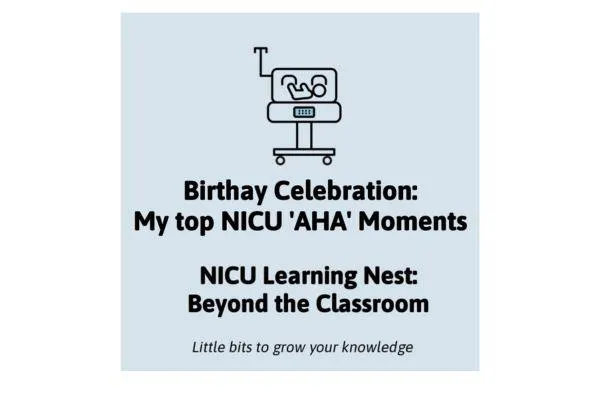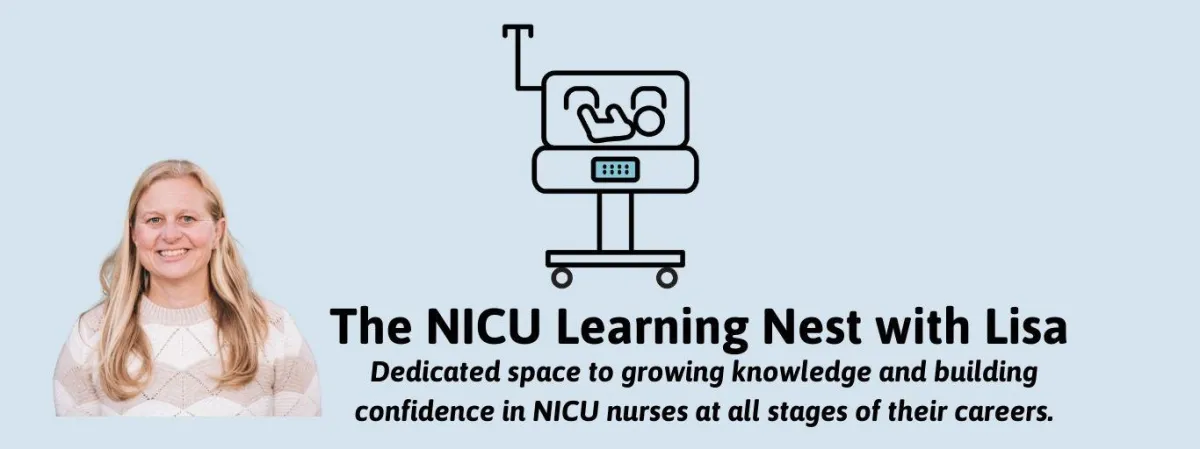
Birthday Special: Top AHA Moments
12 Aha Moments That Shaped My NICU Career
As I celebrate another trip around the sun, I’m reflecting on some of the most powerful lessons I’ve learned in my NICU journey. These “aha” moments didn’t happen all at once—they came from bedside experience, trusted mentors, mistakes, and those moments where everything finally clicked.
I’m sharing these with you not just to look back, but to help you grow forward. Whether you're brand new or a seasoned NICU nurse, there’s always something new to learn—and often, the best lessons are hiding in plain sight.
1. Understanding Fetal vs. Neonatal Circulation Changed Everything
One of my first true aha moments was realizing just how different intrauterine circulation is compared to extrauterine life. Fetal circulation prioritizes oxygen-rich blood from the placenta through the ductus venosus and foramen ovale. After birth, when the placenta is removed, the lungs take over, and the circulatory pathways shift dramatically. This foundational concept explains so many of the challenges we see in the first hours and days of life—from transitional murmurs to persistent hypoxemia.
2. PPHN Isn’t a Heart Problem—It’s a Lung Problem
For a long time, I thought PPHN (Persistent Pulmonary Hypertension of the Newborn) was a cardiac issue because it involves the heart’s pressures and shunts. But truly, it’s a lung issue—caused by high pulmonary vascular resistance that prevents normal circulatory transition. Realizing that the heart is reacting to what’s happening in the lungs helped me better understand treatment goals: reduce pulmonary pressures, optimize oxygenation, and avoid worsening hypoxia.
3. The Placenta is the Greatest Temporary Organ to Ever Exist
Learning about the placenta blew my mind. It’s a temporary organ that functions as the baby's lungs, liver, and kidneys—filtering waste, providing oxygen, and delivering nutrients. It also plays a critical immunological role. A damaged placenta (due to abruption, infarcts, or infection) can explain so many downstream NICU issues—HIE, growth restriction, NEC risk, and more.
4. Breast Milk is Liquid Gold—Literally Tailored to the Baby’s Needs
I knew breast milk was important, but I didn’t know just how adaptive it is. After a mom holds or nurses her baby, her body actually adjusts the composition of her milk—changing fat content, immune components, and hydration based on the baby’s needs. This is especially critical for our fragile preemies, who benefit from the protective and developmental advantages of human milk.
5. Maternal History is a Window into the Baby’s NICU Stay
I used to skim over maternal history on admission. Now I know it holds critical clues. Was there chorioamnionitis? Preeclampsia? No prenatal care? Each piece connects to what we might see: HIE, RDS, NEC, or sepsis. A thorough understanding of the prenatal and perinatal story helps me anticipate complications, prepare families, and tailor care.
6. Medication Calculations Are Life-Saving—Not Just Math
In nursing school, medication math felt tedious. In the NICU, it’s non-negotiable. These tiny patients require microdoses that change rapidly based on weight, condition, and route. One decimal point off can be fatal. And a change in a baby's behavior may need a dose needs to adjusted or increased for their weight gain....pay attention! Getting comfortable with dose calculations, double-checking with colleagues, and never rushing through a med pass has saved lives—and boosted my confidence as a clinician.
7. PIE (Pulmonary Interstitial Emphysema) is Subtle—and Deadly
I’ll never forget the first time I cared for a baby with PIE. It seemed like a sudden desaturation episode—but behind the scenes, air was leaking into the interstitial spaces of the lungs, creating a dangerous ventilation mismatch. In fact, the first baby I ever cared for that died on my shift died because of PIE and inability to ventilate. I'll never forget her. Recognizing PIE early through clinical signs and imaging is key to managing it—often with gentle ventilation strategies, lateral positioning, and sometimes even selective intubation of one lung.
8. Little Vitals Matter: Temperature, Cap Refill, Work of Breathing
We focus so much on heart rate and oxygen saturation that we sometimes overlook the “small” things. But those small things—like a baby’s servo-controlled temp, cap refill time, and subtle changes in breathing effort—are often the earliest signs of deterioration. Learning to pay attention to the quiet clues can help you catch a big problem before it escalates.
9. Every Nurse Makes Mistakes—Including Me
I’ve made mistakes. I’ve charted the wrong time. I’ve missed a small but important change in vitals. I’ve second-guessed myself. What matters is what you do after the mistake: own it, learn from it, and share it with others so they can learn too. We’re not perfect—but we’re always growing.
10. Central Line Care Requires Vigilance and Respect
When I first learned to care for UVCs and PICCs, I was nervous. And rightly so. Central lines are life-saving—but they’re also high risk for infection and complication. I learned to slow down, use strict aseptic technique, and advocate for line necessity reviews. Good line care is a team effort—and it starts with nurses.
11. Infection Prevention is Everyone’s Job—Including Ours
Wiping down the probe. Changing gloves. Not wearing rings. It sounds so basic, but it’s essential. Our tiniest babies have immature immune systems, and we’re often the ones closest to them for the longest time. The consistency of our infection prevention practices can be the difference between a baby thriving or developing sepsis.
12. Getting Comfortable with Parents is a Game Changer
I used to feel unsure around parents—what to say, how much to explain, how to be confident when I wasn’t sure myself. But with time, I’ve learned that connection is the foundation of NICU care. Parents don’t expect us to have all the answers. They want to feel included, respected, and reassured. And once you let yourself connect, you’ll find deeper purpose in your work.
Final Thoughts: Be Patient with Yourself
Twelve aha moments—and I’m still learning. This job is humbling. It demands constant growth, self-reflection, and curiosity. Be patient with yourself. Ask the questions. Seek out trusted resources. Own your growth journey. Whether you’re a brand new NICU nurse or a seasoned one, the learning never ends—and that’s what makes this work so meaningful.
